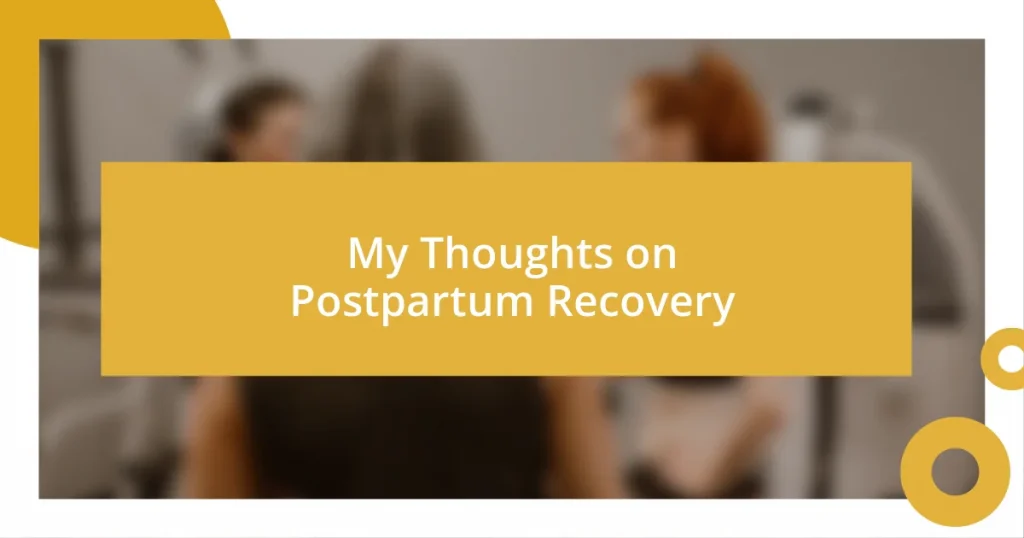Key takeaways:
- Postpartum recovery involves physical and emotional challenges, requiring patience and support from others.
- Nutrition plays a crucial role in recovery, with a focus on wholesome foods and hydration to restore energy and mood.
- Practicing mindfulness, journaling, and establishing a routine helps manage postpartum anxiety and create a sense of control.
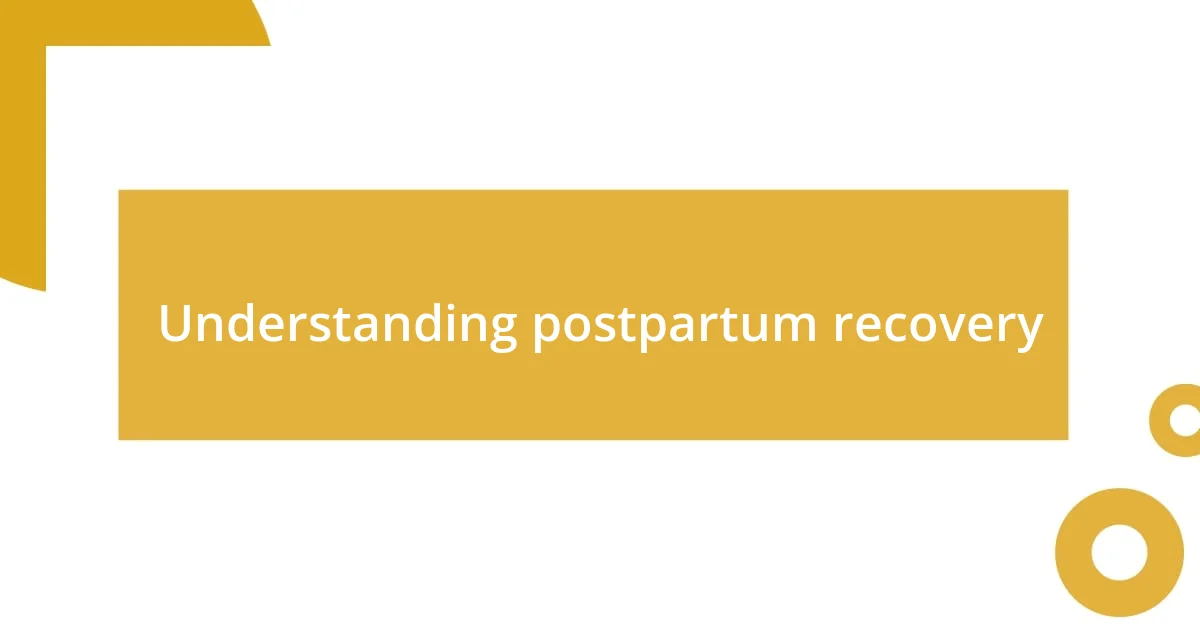
Understanding postpartum recovery
Postpartum recovery is a complex journey, often filled with physical and emotional challenges that can be surprising. I remember how, after my own experience, I felt a whirlwind of emotions—one moment filled with joy, and the next, grappling with feelings of overwhelming fatigue and even sadness. It’s important to remember that this emotional rollercoaster is completely normal; many new parents face similar struggles.
Physically, the body undergoes significant changes, and the healing process can vary greatly from person to person. I found myself astonished by the need to take my time—something I wasn’t prepared for. Have you ever felt the pressure to bounce back quickly after a major life event? It’s almost as if society expects new parents to seamlessly transition back to their pre-baby selves, which can be quite unrealistic.
Moreover, postpartum recovery isn’t just about the physical dimension; it also deeply involves mental well-being. I recall attending a support group and realizing I wasn’t alone in my feelings of anxiety and self-doubt. Did you know that one in seven new mothers experience postpartum depression? It highlighted for me the importance of seeking help and fostering a supportive community—something I urge everyone to consider as an essential part of their recovery process.
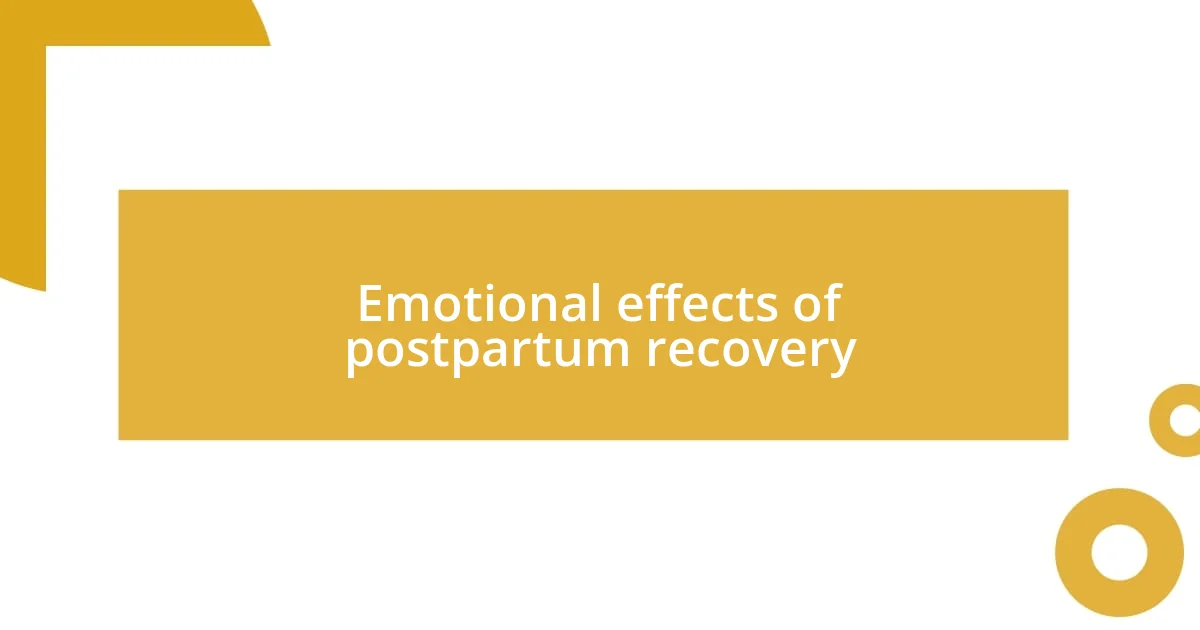
Emotional effects of postpartum recovery
The emotional effects of postpartum recovery can be incredibly profound. I distinctly remember having moments where joy sparked with my new baby, but then darker emotions crept in unexpectedly. It felt isolating at times, as if I was trapped in a bubble where everyone else was thriving, while I was trying to navigate this complex new reality.
Here’s a breakdown of some common emotional experiences during this phase:
- Mood Swings: Rapid shifts between happiness and sadness can be bewildering.
- Anxiety: Thoughts about being a good parent often swirl in your mind.
- Identity Struggles: I found myself questioning who I was beyond being a mother.
- Overwhelm: It’s normal to feel the weight of responsibilities crashing down around you.
- Support Seeking: Connecting with others who understand your feelings can be incredibly therapeutic.
Trust me, acknowledging these emotions is the first step toward healing. It’s crucial to give yourself the grace to feel everything and to reach out when things become too heavy.
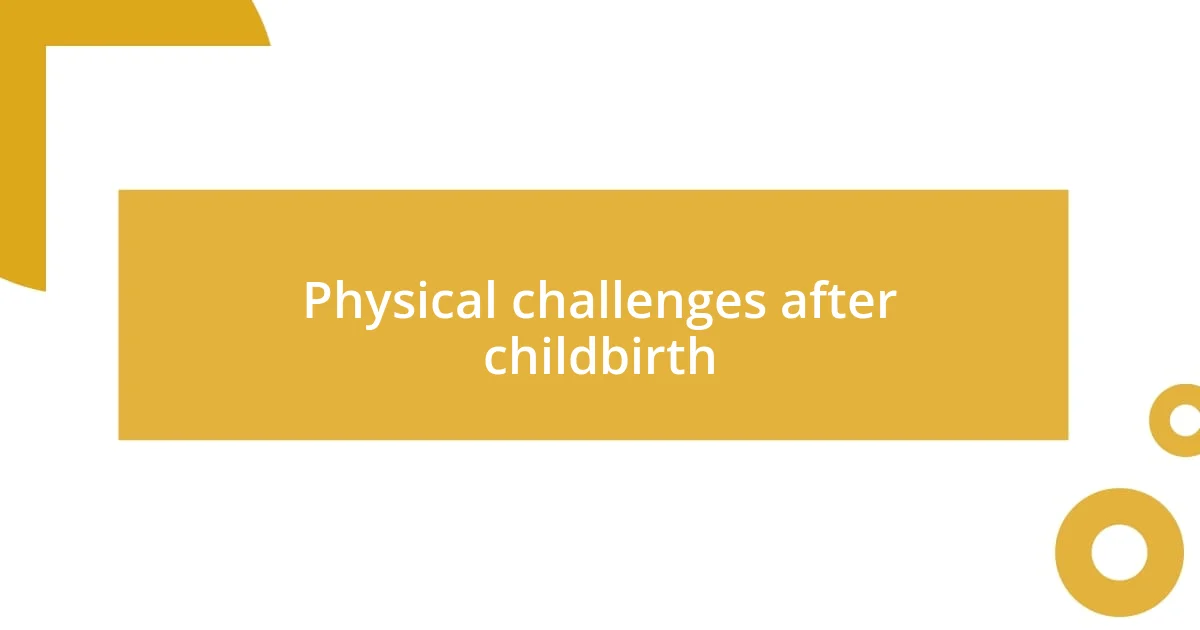
Physical challenges after childbirth
Physical challenges after childbirth can be quite daunting, and I must admit that I was utterly unprepared for the toll it would take on my body. I remember standing in front of the mirror a few weeks post-delivery, feeling disconnected from the reflection that stared back at me. The changes—swollen feet, abdominal soreness, and the unpredictability of postpartum bleeding—were all constant reminders of how much I’d just been through. It’s a harsh reality when all you want is to feel like your old self again.
One of the most surprising aspects of my recovery was the struggle with stamina. Simple tasks like walking across the room or caring for my baby left me exhausted. I foolishly thought that the act of giving birth would somehow grant me superhero status—how naive! I learned that physical recovery is a gradual process, and taking small, manageable steps is key. I found myself more appreciative of the little victories, like increasing my daily walk by a few more minutes. Have you ever celebrated something that seemed small but felt monumental? That was my experience with postpartum recovery.
Additionally, I encountered challenges with breastfeeding and its impact on my physical health. Initially, I was gung-ho about it, but the discomfort quickly set in. Cracked nipples and the feeling of being tethered to the baby were tough to navigate. In those early days, I often felt torn between my commitment to breastfeed and my desire for comfort and independence. It’s important to remember that every mother’s journey is unique, and it’s okay if breastfeeding doesn’t go as planned.
| Physical Challenge | Description |
|---|---|
| Fatigue | Intense tiredness due to sleep deprivation and recovery demands. |
| Body Changes | Visible changes such as swelling, weight gain, and abdominal soreness. |
| Breastfeeding Discomfort | Painful nipples and the physical demands of frequent feeding. |
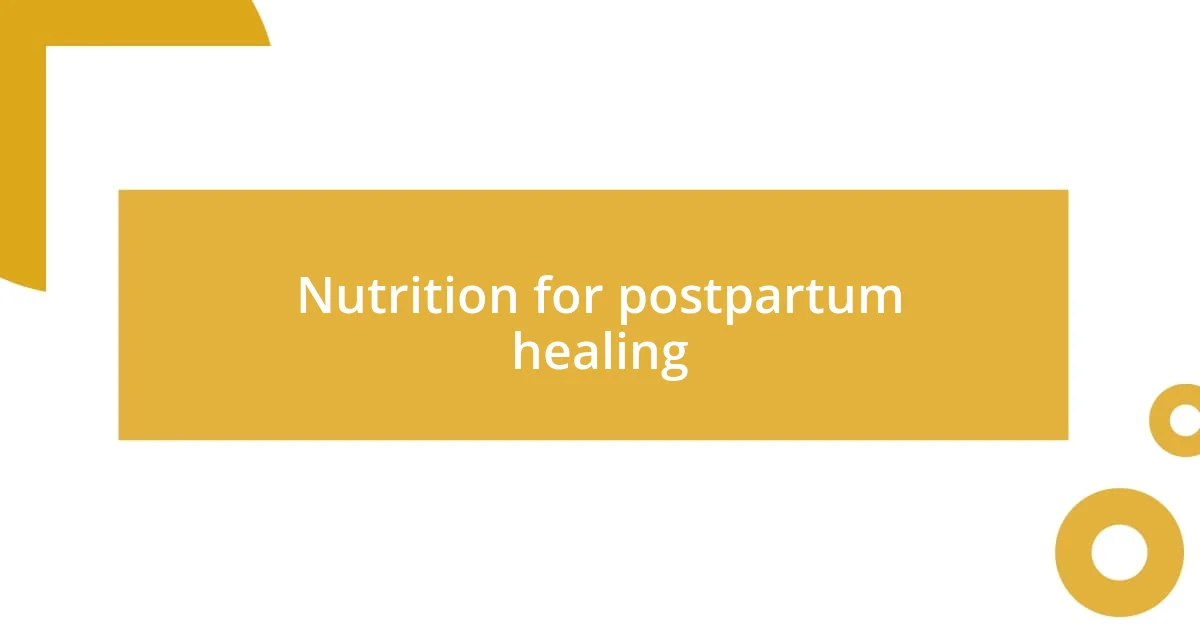
Nutrition for postpartum healing
Nutrition is incredibly vital during postpartum recovery, and I can’t stress this enough. When I think back to those exhausting days filled with sleepless nights, fueling my body with the right nutrients made a significant difference. I remember gravitating towards wholesome foods, like leafy greens and hearty grains. They didn’t just nourish me; they helped restore my energy and mood. Have you experienced that surge of vitality that a simple meal can provide?
Adding protein became a foundational part of my diet, especially since it played a key role in healing. I often prepared dishes loaded with beans, chicken, or fish, not only to support muscle recovery but to keep me feeling satiated. There were days when I felt like I could hardly move, so having a meal that gave me a boost was essential. It was like a small act of self-care, reminding me that I needed to prioritize my health just as much as I prioritized caring for my newborn.
I also discovered the magic of hydration during this time. It’s easy to forget to drink enough water amid the chaos of parenting. I set reminders on my phone to encourage me to drink fluids regularly. Each sip felt refreshing, almost as if I was washing away the fatigue. Remembering to stay hydrated not only supported my physical health but also uplifted my mood, making me feel more connected and present as a new mom. Isn’t it fascinating how something so simple can have such a profound impact?
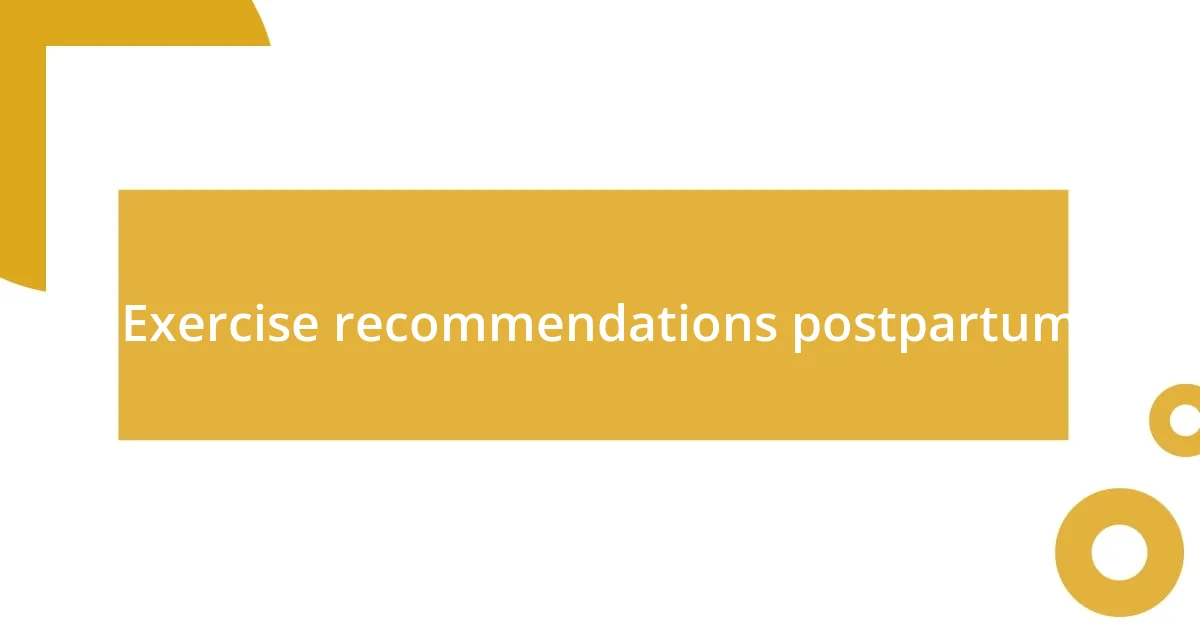
Exercise recommendations postpartum
Exercise Recommendations Postpartum
When it comes to exercising postpartum, patience is vital. Early on, I found myself eager to jump back into my pre-baby routine, only to realize my body needed time to heal. I remember starting with gentle walks around my neighborhood; they became a soothing ritual that not only helped my body but also provided a moment of clarity amidst the new chaos of motherhood. Have you ever felt that blend of exhaustion and exhilaration while doing something so simple yet so essential? I certainly did.
As I progressed, I began incorporating pelvic floor exercises, which are particularly important after childbirth. I still recall attending a postpartum yoga class that focused on gentle stretches and breathing techniques. It felt like a breath of fresh air—literally! Just being in a room with other new moms, sharing our experiences, made me feel less isolated. Isn’t it comforting to know that you’re not alone on this journey?
Eventually, I found joy in slightly more vigorous activities, like low-impact aerobics or cycling. I learned that engaging in exercise not only aids in physical recovery but also significantly boosts mental health. The endorphins from a brisk workout made me feel alive again, reminding me that I was more than just a mom. It was an essential piece of rediscovering myself, and I can’t stress enough how invaluable it is to gradually transition back into fitness. What steps could you take to feel empowered in your postpartum recovery through movement?
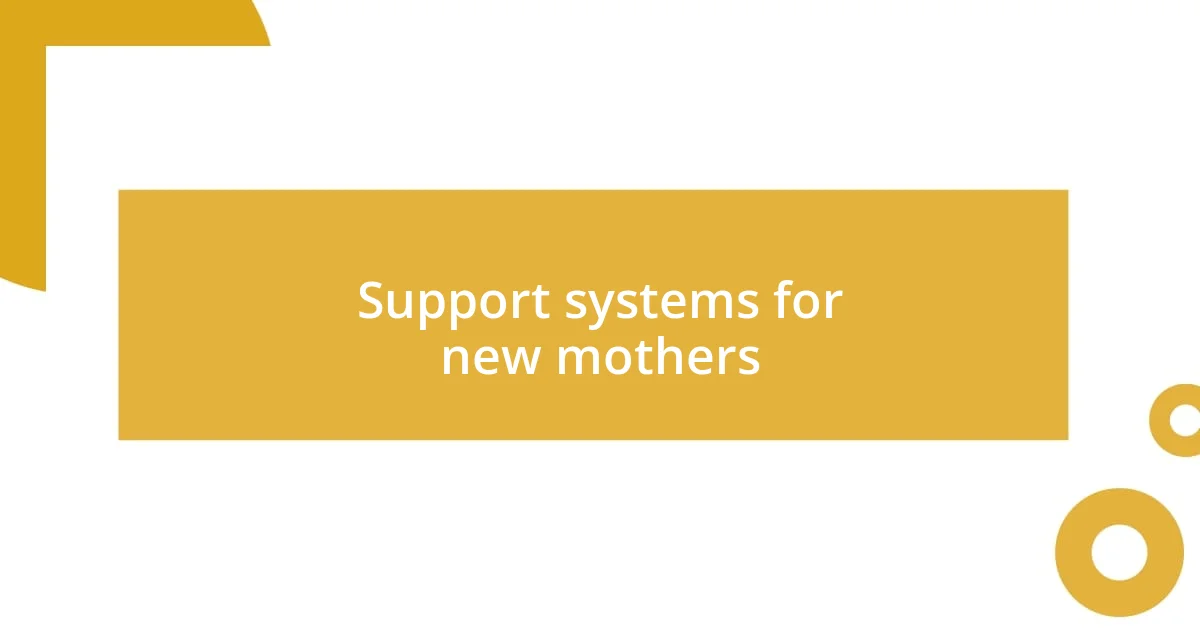
Support systems for new mothers
Support systems can make a world of difference for new mothers. I remember the first days at home with my baby—how overwhelming everything felt. Having family and friends around offered much-needed laughter and conversation, breaking through the isolation that sometimes crept in. Just a simple text from a close friend asking how I was doing could lift my spirits tremendously. Have you ever felt that warmth when someone checks in on you? It’s a reminder that you don’t have to navigate this journey alone.
Seeking out support groups also played a crucial role in my postpartum experience. I attended a local meet-up for new moms, and I still cherish those moments. Listening to others share their struggles made me realize that my feelings weren’t unique; they were shared. It brought an incredible sense of belonging! Have you considered finding your tribe? Sometimes just knowing others are in the same boat can be so comforting.
On the practical side, enlisting help with daily tasks became essential for my well-being. I vividly recall one weekend when my sister came over to help clean my house. It might sound mundane, but it felt like a weight had been lifted off my shoulders. I could focus on my baby without the nagging worry of household chores. How often do we overlook the simple act of asking for help? Each small gesture towards building a support system not only nurtured my recovery but fostered deeper connections within my circle. It’s about empowering ourselves through community and care.
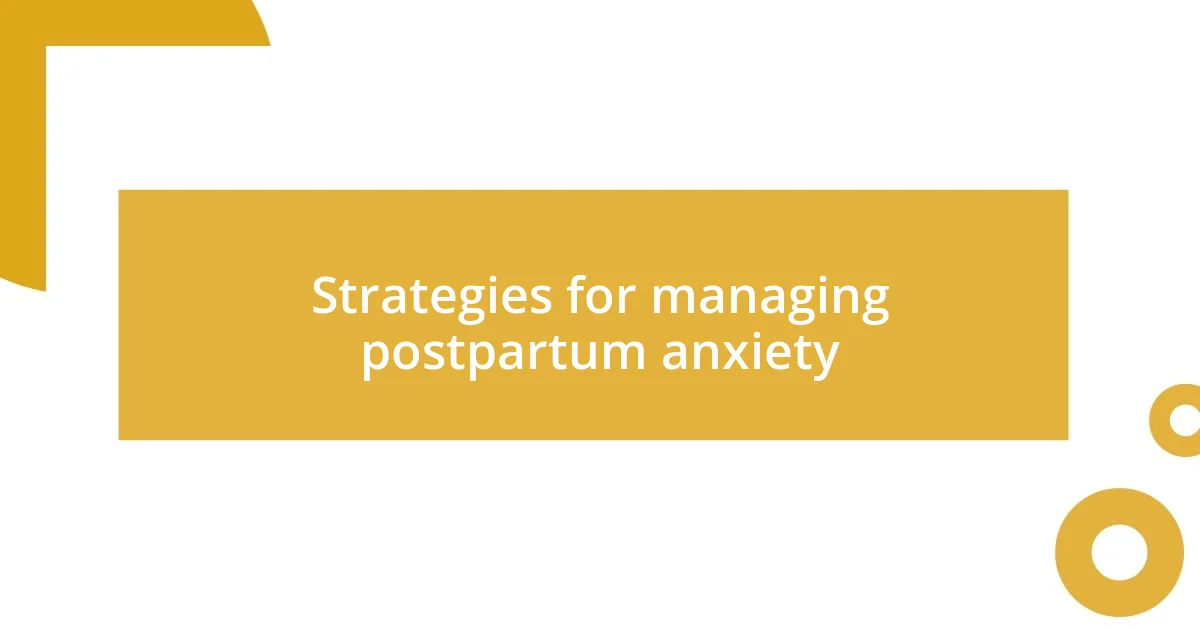
Strategies for managing postpartum anxiety
Managing postpartum anxiety can sometimes feel like an uphill battle, but there are practical strategies that I found incredibly helpful. One of the most effective for me was mindfulness meditation. I remember setting aside just five minutes each morning to focus on my breath and ground myself in the present. Have you ever noticed how a few moments of quiet can transform your mindset? This simple practice turned out to be a lifeline, helping me navigate the waves of anxiety that often washed over me.
Another approach that made a significant difference was journaling. I began writing down my thoughts and feelings during those sleepless nights and found it therapeutic. As I poured my heart onto the pages, it not only helped me process my experiences but also cleared the mental clutter. Can you recall a time when writing something down brought you clarity? For many, including myself, this routine became a safe space to acknowledge my emotions without judgment, creating a healthier dialogue between my mind and heart.
Lastly, I found that developing a daily routine was essential in managing my anxiety. Establishing a rhythm—not just for myself but for my baby too—provided a sense of control amidst the uncertainty of motherhood. I still think back to those early weeks when the mornings were chaotic. By prioritizing a consistent schedule for meals and naps, I could experience a little predictability. Isn’t it amazing how something so simple can offer comfort? Through these strategies, I learned that finding what worked for me was a vital step towards reclaiming my peace of mind.









